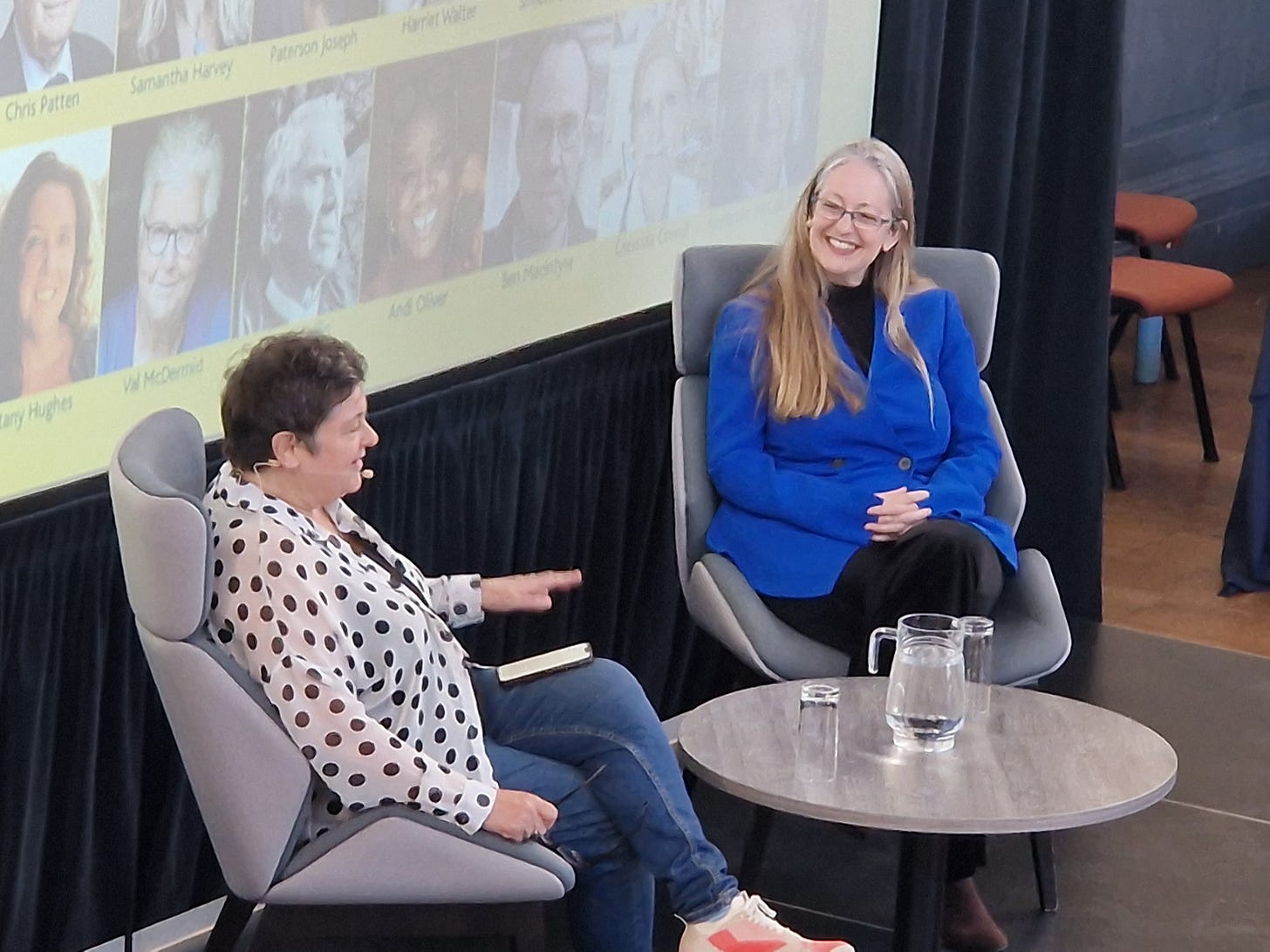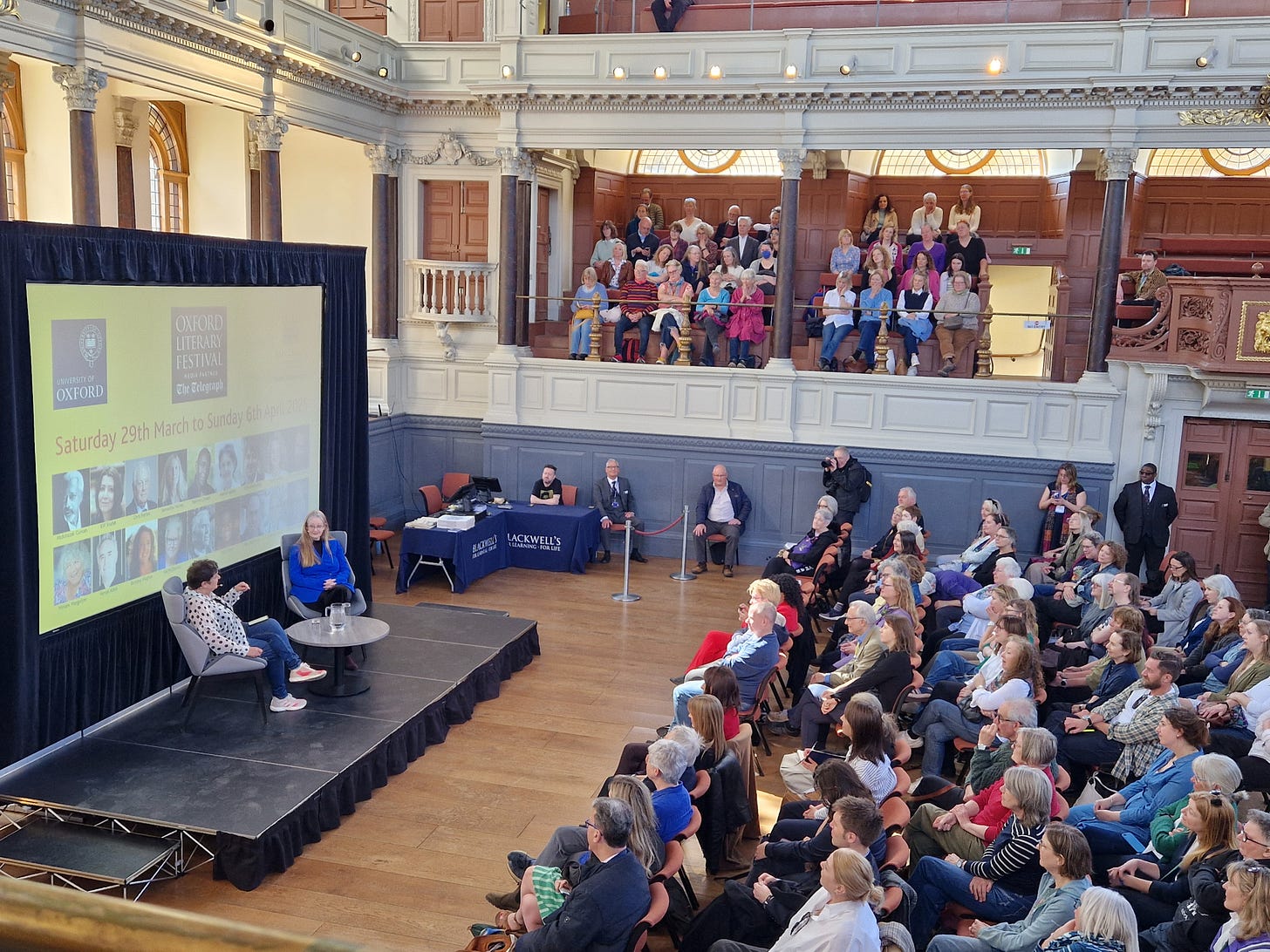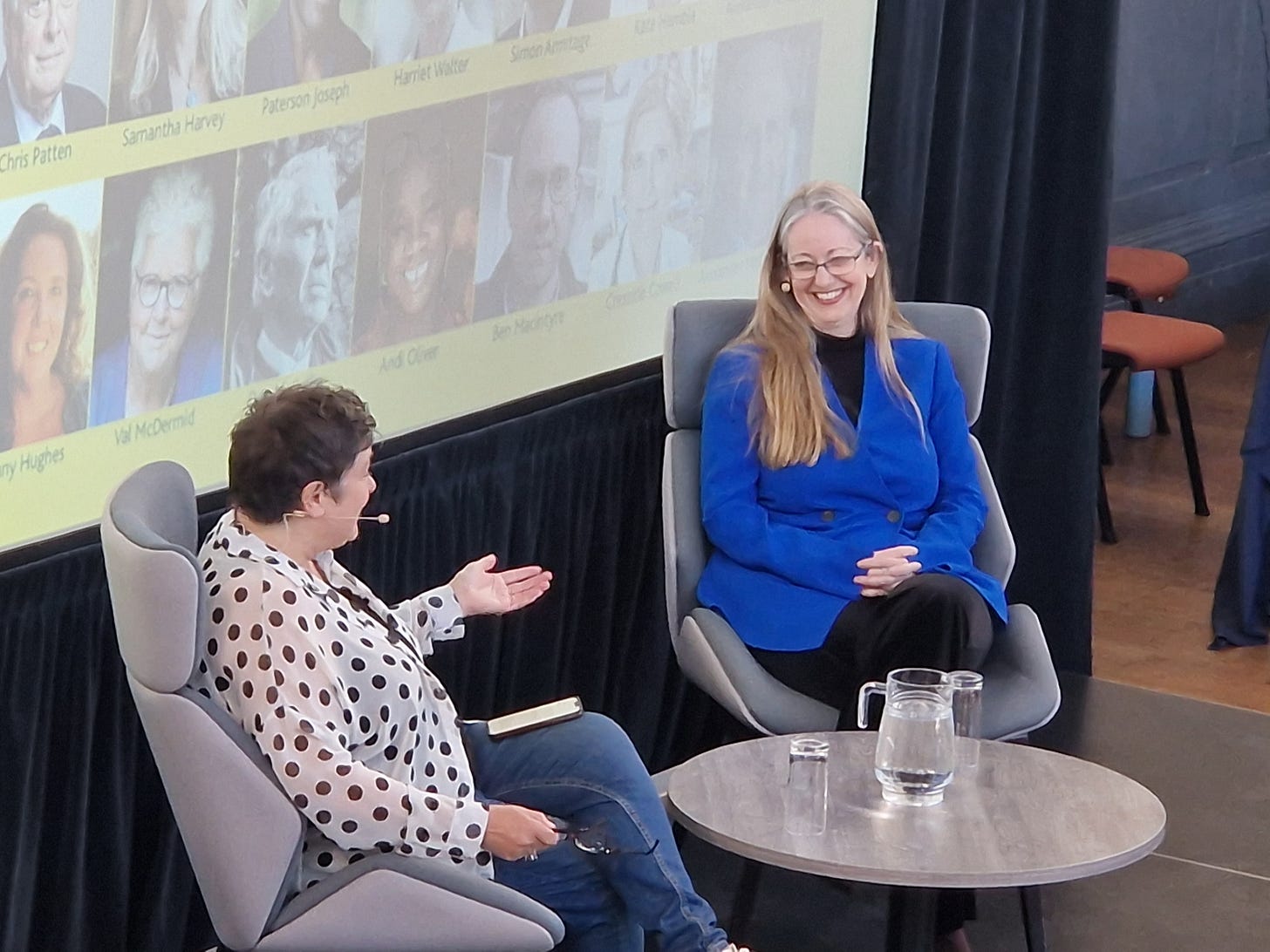Happy Sunday everyone and welcome to this week’s nosebag. Usually I offer you six things that I’ve been reading, writing or thinking about this week, but for this edition I’m just going to offer you one great thing: a report on an event I was lucky enough to attend: Helen Joyce talking to Julie Bindel at the Oxford Literary Festival.
On Wednesday, amidst a week in which the other main highlight was my car spectacularly failing its MOT and being sent off to be remade into tuna fish cans (I spent every other day hunting for a replacement set of wheels), I traveled to Oxford Literary Festival for a very momentous occasion: the ‘platforming’ of Helen Joyce, author of Trans: When Ideology Meets Reality.
I first heard of Helen Joyce in the summer of 2021 - the hardback of Trans was published that July. I can still remember exactly where I was and what I was doing - driving along in the summer heat on the long straight road out of my Somerset village - when I heard her being introduced on the FiLiA podcast: a woman with PhD in mathematics and an editor at The Economist, who was able to set out very clearly the ramifications of changing the fundamental rules of logic, of upending the very basis of reality on which we have built our world - of basically saying that one plus one now equals three.
Joyce is really brilliant every time she opens her mouth, but I do think this FiLiA podcast is worth a re-listen.
I could so relate to the way she describes how she first became curious about this topic. “It’s very strange to be asked really really really dumb questions by people you’re used to hearing sensible questions from”, she says. “You don’t know what to say, you sit there thinking what have I missed? I spent about a year trying to find out what I’d missed…and found just the most appalling, weak, unexamined pieces of work. This whole ‘no debate’ thing, its not just a slogan, they really don’t allow any debate - it’s amazing how poor a body of knowledge is when people aren’t allowed to debate it, you can knock down all the arguments with not much effort.”
At this point in time, I’d also spent a year or so ‘trying to find out what I’d missed’, and realising, as Joyce describes so well, that there was nothing to find apart from vacuous arguments about clownfish. As the summer of 2021 was reaching its peak, it wasn’t just the heat that was building: Maya Forstater won her appeal on June 10th; Chimamanda published her essay It is Obscene on June 15th; on June 23rd, the Royal Academy had to apologise to Jess de Wahls; on 11th July, my own story was run by the Sunday Times, and a few days later, I drove along listening to the FiLiA podcast. In a situation in which many people seemed to have completely lost their minds - I’ve written, for example, about the online group of doulas who suggested I include information in my puberty book for 9 to 12 year old girls about how boys can simulate a period, by mixing corn starch and red food colouring - hearing Joyce speak with such intellectual clarity was an enormous relief.
But in spite of her journalistic pedigree, and the fact her book was a Sunday Times bestseller, Joyce was never invited to speak at a single literary festival - until last Wednesday. It was for this reason that I, like many other women, felt compelled to gravitate to Oxford. The event, in which Joyce was interviewed by Julie Bindel in the literary festival’s largest venue, the 750 seat Sheldonian, was sold out.

The event organiser, Professor Gary Francione, seemed a little nervous. When he introduced Helen and Julie, he repeatedly asked for the debate and questions to be respectful, and when he wrapped up at the end, his surprise and relief that this huge audience, largely made up of middle aged feminists, had been so calm and considerate, was quite amusing. Perhaps he had been worried that the event would be infiltrated by protestors? But of course, they remained on the outside, about a dozen of them by all reports, banging pots and chanting slogans for a bit until they clearly got bored and went home to their mums. Francione also described how the festival had tried to find someone to ‘debate’ Helen at the event, but, as Joyce herself put it, “by a remarkable coincidence everyone we could think of was away or washing their hair during the entire week-long festival”. (More on that from Helen on twitter today)
There were two press reports of the event, which I’ve archived for you:
Both focused on remarks Joyce made that doctors who have performed trans surgeries on minors should be jailed, but neither mentioned that the person who asked the question that prompted her to say this was none other than Richard Dawkins.

Dawkins pointed out that doctors who had carried out such surgical procedures had gone against the hippocratic oath, and asked if they should be struck off. Helen’s response to him was much more wide ranging than the headlines suggest - she talked about how women in particular had been treated as a problem to be fixed throughout the history of medicine, with a particular focus on the removal of organs. “Doctors have a history of cutting out ovaries”, she said, pointing out how in the late 19th and early 20th century women had them taken out as a treatment for nosebleeds. This is indeed true, and they were also removed as a treatment for a wide range of conditions from epilepsy to poor mental health, and even, in some cases, for ‘unwomanly’ behaviour - talking back, fighting back, being outspoken.
I thought of her words when I read in the news this week that lesson plans produced by Collins for secondary school children suggest that Joan of Arc may have been non binary.
There are obvious lines of connection that run between nineteenth century doctors removing ovaries from troublesome women who don’t conform to gender norms, and twenty first century doctors removing the breasts and reproductive organs of…troublesome (and / or troubled) women who don’t conform to gender norms. These lines of connection run, too, to the strong and feisty women who refused to play by the rules of their day - Joan of Arc, Elizabeth I, the Bronte sisters, Anne Lister, Hatshepsut - now declared to be not women at all, but non binary. It’s hard to find an example of a person who has been posthumously declared non binary who is not female. This is because, historically, men have mostly been allowed to do whatever the heck they like, whilst women have had lives, bodies, expectations and obligations they wish to escape from. Those who possessed the mix of bravery and luck required to put on a pair of trousers and say #nothankyou to marrying the fat old Duke with the bad breath, were certainly unusual, but they were still female. A ‘gender non-conforming’ woman is a role model, a person to celebrate, not rewrite as male or mutilate with surgery.
On the podium at Oxford Lit Fest, Helen Joyce also described how she herself is gender non conforming. “I have a PhD in Mathematics for gods sake”, she said, and then told a story about her husband moving with her for her work that I was enjoying myself too much to note down. I contacted her this morning to ask her to repeat it, and to say more about gender non conformity.
“When I moved to Brazil in 2010 for The Economist as a foreign correspondent the only visa spouses eligible for there on journalist visas are 'dependent' - no right to work”, she told me. “So I moved my family as dependents for my job. Very gender non conforming. But the most gender non conforming thing I do - and I do it every day - is tell men who want women's stuff to fuck off, and then fuck off some more. The central truth of 'gender', as Victoria Smith has written so well, is that what men want from women, women must give them without complaint or even any acknowledgement. That's why men hate 'TERFs' so much - TERFs say to men 'yes, I know you really want in, you really want us to play along, you really want us to put ourselves second, but we won't. NO.'”
There’s a reason why it’s taken four years for a literary festival to platform Joyce - it’s because she forces people to join the dots, and, as she said to FiLiA, ‘knocks down the arguments without much effort’. This is also the reason why nobody would debate her, and why the activists would rather protest outside than actually listen to what she has to say. She unapologetically holds the line, and says no. And if you look at this history of how women who do this have been treated, and continue to be treated, you see just how important it is that she is given a platform.
Please subscribe so that you never miss a post. You can subscribe for free, but paid subs help support me to keep writing. Substack is a new model of reading in which you get to pay money directly to the writer, rather than to the newspaper or advertiser. Have you noticed how lovely this advert free space is (apart from this one!)? It’s only a very small amount a month but each subscription adds up to mean that writers like me can get paid for our work. Thank you.
I’ve written four books, would you like one?







I wanted to come however was at work where the concept of pregnancy being a normal physiological event has been turned into a high risk act which backs up the historical context Helen describes about women’s bodies. Thanks for the description and how was Julie ?
Thank you so much!! I happen to be in Oxford now ( coming from the wastelands of middle USA) but as soon as I found out that Helen Joyce would be at the literary festival it was already sold out!! Waaa!!
At least I get your level headed and well written report!!!